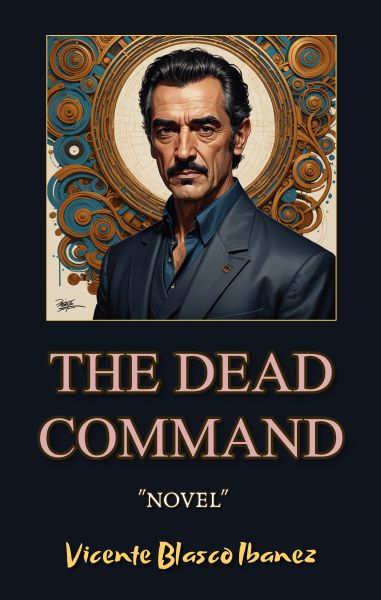The Dead Command
(Novel)
Jaime Febrer arose at nine o'clock. Old Antonia, the faithful servant who cherished the memory of the past glories of the family, and who had attended upon Jaime from the day of his birth, had been bustling about the room since eight o'clock in the hope of awakening him. As the light filtering through the transom of a broad window seemed too dim, she flung open the worm-eaten blinds. Then she raised the gold-fringed, red, damask drapery which hung like an awning over the ample couch, the ancient, lordly, and majestic couch in which many generations of Febrers had been born and in which they had died.The night before, on returning from the Casino, Jaime had charged her most earnestly to arouse him early, as he was invited to breakfast at Valldemosa. Time to get up! It was the finest of spring mornings; in the garden birds were singing in the flowery branches swayed by the breeze that blew over the wall from the sea.The old servant, seeing that her master had at last decided to get out of bed, retreated to the kitchen. Jaime Febrer strolled about the room before the open window almost nude. There was no danger of his being seen. The dwelling opposite was an old palace like his own, a great house with few win-dows. From his room he could see a wall of indefinite color, with deep scars, and faint traces of ancient frescoes. It was so near, the street being extremely narrow, that it seemed as if he might touch it with his hand.
Vicente Blasco Ibáñez (1867 1928) was a journalist, politician and best-selling Spanish novelist in various genres whose most widespread and lasting fame in the English-speaking world is from Hollywood films adapted from his works.Short Biography:He was born in Valencia. At university, he studied law and graduated in 1888 but never went into practice. He was more interested in politics, journalism, literature and women. He was a particular fan of Miguel de Cervantes.In politics he was a militant Republican partisan in his youth and founded a newspaper, El Pueblo (translated as The People) in his hometown. The newspaper aroused so much controversy that it was taken to court many times. In 1896, he was arrested and sentenced to a few months in prison. He made many enemies and was shot and almost killed in one dispute. The bullet was caught in the clasp of his belt. He had several stormy love affairs.He volunteered as the proofreader for the novel Noli Me Tangere, in which the Filipino patriot José Rizal expressed his contempt of the Spanish colonization of the Philippines. He travelled to Argentina in 1909 where two new cities, Nueva Valencia and Cervantes, were created. He gave conferences on historical events and Spanish literature. Tired and disgusted with government failures and inaction, Vicente Blasco Ibáñez moved to Paris at the beginning of World War I. When living in Paris, Ibáñez had been introduced to the poet and writer Robert W. Service by their mutual publisher Fisher Unwin, who asked Robert W. Service to act as an interpreter in the deal of a contract concerning Ibáñez.He was a supporter of the Allies in World War I. He died in Menton, France in 1928, the day before his 61st birthday, in the residence of Fontana Rosa (also named the House of Writers, dedicated to Miguel de Cervantes, Charles Dickens and Honoré de Balzac) that he built.
Versandkostenfreie Lieferung! (eBook-Download)
Als Sofort-Download verfügbar
- Artikel-Nr.: SW9786059496193110164
- Artikelnummer SW9786059496193110164
-
Autor
Vicente Blasco Ibanez, Vicente Blasco Ibanez
- Wasserzeichen ja
- Verlag E-Kitap Projesi & Cheapest Books
- Seitenzahl 400
- Veröffentlichung 23.11.2024
- Barrierefreiheit
- ISBN 9786059496193

